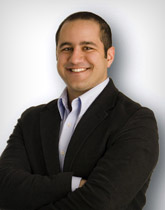In 2002, the dot-com bubble-burst was still a fresh reminder that success is far from a guarantee for anyone considering starting an Internet business. But as Hooman Radfar pursued his MS in information networking at Carnegie Mellon, he remained undeterred in his dream of establishing his own startup.

That dream first came into focus a few years earlier, during his undergraduate days at Penn, where he began his studies on a pre-med track. But an “electrifying” lecture changed his mind. The speaker, Josh Kopelman, had in 1999 cofounded Half.com, where online shoppers could purchase books, music, movies, and video games at a discounted fixed price. A year later, the founders sold the venture to eBay for a reported $350 million. The financial success intrigued Radfar and reassured him that switching majors from pre-med to computer science wasn’t a foolhardy decision.
The lecture also made him seek out a class taught by Tom Cassel, who created Reading Energy Holdings, a pioneer in the independent electric power industry. Radfar wasn’t alone in trying to sign up for the class. It was consistently oversubscribed, leaving many students, including Radfar, shut out.

Undaunted, he persistently popped in on Cassel during office hours, imploring him to squeeze him into his class. It led to something more; Cassel agreed to mentor Radfar in an independent entrepreneurial study program. The mentorship culminated with Cassel recommending that Radfar attend Carnegie Mellon’s graduate school to get a strong background in information technology before starting any kind of tech business.
Radfar listened to his mentor. At the College of Engineering he immersed himself in the study of social networks, becoming obsessed with how people make their choices. “It was beautiful to me. I loved it; I got it,” he says.
In 2004, he and another student, Austin Fath, fused their interests in social networks and Web services into Clearspring Technologies, which helps Web site publishers connect sharable content and then analyze it.
There was quite a market for the services; in 2007, Radfar (E’04) and Fath (E’04) were named among America’s Best Tech Young Entrepreneurs by BusinessWeek. Soon after, Fath decided to pursue other opportunities while Radfar continued to grow Clearspring.
Today, the company has more than 100 employees and 12 million users. Brands such as Home Depot, Microsoft, and Starbucks are using Clearspring technology. The success has led to a recent infusion of $20 million in venture capital and Radfar was recently nominated for Ernst & Young’s Entrepreneur of the Year award.
—Elizabeth Shestak (DC’03)
This university initiative includes a portfolio of five campus incubators that help turn campus innovations into sustainable new businesses. Home to more than 100 research institutes and centers, the university’s award-winning professors and students produce an average of 15-20 new companies each year, such as Clearspring Technologies, which spurs both economic growth and job creation. Learn more: www.cmu.edu/startups



